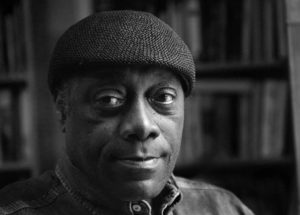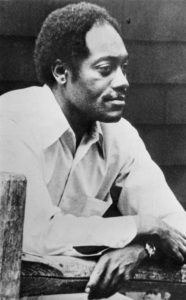Only part of this post concerns writing technique; mostly, it focuses on my mentor and friend, James Alan McPherson, who died this summer. However, that single consideration is an enormously important perspective on process, one that can guide any writer.
Jim was one of my first workshop teachers at the Iowa Writers Workshop, in 1990. Coming into the classroom for the first time, I found him imposing: a wide face, a broad body, a habit of tucking his lips and biting both, and a compressed small smile that one could interpret as judgmental or condescending. Also, having won a Guggenheim Fellowship, a Pulitzer Prize, and a MacArthur Fellowship, he had an intimidating reputation.
In fact, he was soft-spoken, deliberative, rather shy, dismissive of his awards; he tended to mumble and sometimes stuttered. He also created a gentle critical culture in his classroom, very different from the slashing, cynical style of the Workshop’s director, Frank Conroy.
To review your own or someone else’s work, Jim believed, you shouldn’t hammer the story until it breaks, then inspect the pieces to find out what was wrong. If it’s an early draft, it’s already in pieces! Instead, find the story’s center. Keep trying to find that center, and move the chips and shards and disconnected moments toward it. Discover the theme, the moral core, then build story around that core.
This is the most essential principle of the art I’ve learned in twenty-six years of writing, and when my novels or stories seem to fall apart and slip between my fingers, I remember it. It always helps.
He also believed strongly in the power of compassion, or, more accurately, empathy. Being able to put yourself in the shoes of any kind of person — whatever color, income bracket, job, level of education — was not just an approach to creating credible fictional characters but a life principle.
I got to know Jim outside the Workshop because we both favored a particular Iowa City diner for breakfast. In fact, we both had a taste for baking powder biscuits smothered in sausage gravy. We had breakfast together once or twice a week during my years there, and we often lingered long after the plates had been removed.
We talked about everything. He was receptive to my thoughts about the arts — especially music — politics, social theory, neuroscience, religion, rural versus urban life, growing up poor versus growing up well-off. I told him of my past: born into an artists’ community, living in different parts of the country and shit poor after my father’s death; successive careers as mailman, logger, carpenter, musical instrument builder, and musician.
He was candid about his own life, too. He told me about his childhood in Georgia, and he reflected on a wide range of interests, drawing on his academic or amateur scholarship in history, social sciences, the arts, cultural anthropology. His beginnings were not easy, either, but he’d worked his way up and had attended Harvard Law School – which he spoke of with some disdain.
In my next post, I’ll recount James McPherson in terms his many eulogies probably did not — another side of this multi-dimensional man.




Hello Daniel! I’m reading the second of your three Cree novels. Your prose and your view of spiritual possibilities has me hooked. I fancy myself a writer having written a three-act play as my PhD creative writing dissertation, directed by Janet Burroway. At FSU I fell in love with Teresa Violett, a talented soprano soloist, who sings opera in a number of languages, and who shares my broad Christian beliefs and lifestyle. While teaching writing I invested three thrilling years of my life working toward my Master of Divinity at Candler School of Theology of Emory University in Atlanta while pastoring several small United Churches in Georgia while Teresa and I lived in ranch-style brick personages in South Georgia and then North Georgia. We are now in Germantown, MD, part of the D.C. metroplex where Teresa serves as Director of Musical Arts and I serve as an Elder for this wonderfully culturally diverse Presbyterian (PCUSA) in the second most diverse county in the U.S. I am presently writing a novel, Dreams and Depressions based on my own wild and wooly life that Teresa tells me will require a trilogy and a lot more writing than I have been putting lately. Your own biography has inspired me to seek you out and to inquire about your own spiritual/metaphysical leanings. Thanks for your clean, inspiring writing. Jim McCoy